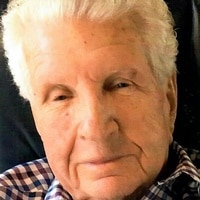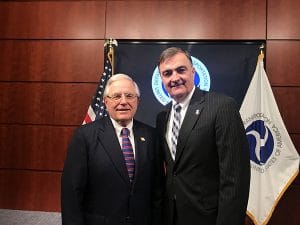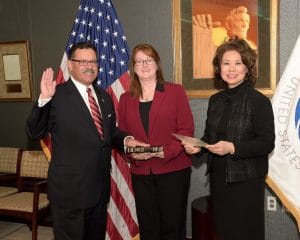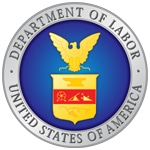Union members from all over Nebraska are invited to attend a Workers Summit on Friday, April 6 in North Platte, Neb.
Jim “Doc” Moore, a retired associate professor of labor history at Cornell University’s School for Industrial and Labor Relations, will moderate the meetings at 1 and 5 p.m. at the Quality Inn and Suites, 2102 S. Jeffers St., North Platte, NE 69101.
“The purpose of the labor summit is to unite all the unions and to better inform our members of the issues that are important for our safety and welfare,” said summit organizer Terry Sigler, a retired legislative representative of SMART Transportation Division Local 286 in North Platte.
Topics of discussion will include S. 1451 – the Railroad Advancement of Innovation and Leadership with Safety Act; S. 2360 and HR 233 – the Senate and House versions of the Safe Freight Act and cuts to the Occupational Safety and Health Administration’s budget.
Strategies about how to mobilize to have union workers’ voices heard will be discussed, and questions from attendees are welcome during the discussion.
SMART TD Nebraska State Legislative Director Bob Borgeson and Dean Mitchell, SMART TD political consultant of DFM Research in Minnesota, will be among the presenters.
Author: bnagy
Brother Robert “Rob” J. Hemling, 39, of Randolph, Wis., and a member of Local 590, died in a train accident March 27 in Sparta, Wis.
Brother Hemling, a conductor for Canadian Pacific, was working at Cedar Creek Lumber when he was killed. Police and media reports did not provide details about the circumstances of the accident.
He began working for the Wisconsin & Southern Railroad before joining Local 590 in 2003.
He is survived by his wife, Megan; his two daughters, Madelynn and Savannah; parents, Randy and Kathy Hemling of Beaver Dam; his siblings, Rachel (Corey) Bradley of Beaver Dam, Andy (Shelly) Hemling of Randolph and Aleshia (Clint) Redeker of Randolph; parents-in-law, Terry and Betty Boomsma of Beaver Dam; a sister-in-law, Tara (Justin) Kienast of Burnett; grandmothers, Evelyn Schumacher of Randolph and Lucy (Gordon) Braaksma of Randolph; a step-grandmother, Deb Stiemsma of Randolph; nieces and nephews, Cole, Brandi, Hunter, Emma, Griffin, Paisley, Aidan, Kate, Alayna, Taylor, Brody, Kaiden and Sam; aunts, uncles, other relatives and friends.
Visitation will be 4 to 8 p.m. Monday, April 2, 2018, and on Tuesday, April 3, 2018, from 10 a.m. until an 11 a.m. funeral service at First Reformed Church, 406 S. High St., Randolph, with Pastor Linda Heisler officiating. Burial will follow in Randolph Cemetery.
A memorial fund directed toward Brother Hemling’s family has been set up at https://www.gofundme.com/conductor-rob.
Great Lakes Airlines, a Wyoming-based regional carrier, announced that it will suspend scheduled flight operations effective Monday, March 26, after more than 40 years in business.
A release from the company said that it was going to lay off employees and that its 34 planes were available for sale.
“Critical staff members needed to support the scheduled airline certificate, repair station certificate, reservation platform and maintain the fleet will be kept onboard until the airline’s assets can be sold,” the release said.
A notice on the company’s website said that Great Lakes was not entering bankruptcy.
“Although we are ceasing flight operations, it is important to note that the company has not entered bankruptcy and will continue to operate certain segments of the business,” the release from company officials said. “We will continue to support the ADI flights operating between Denver, Pierre and Watertown.”
ADI -– Aerodynamics Inc.– operates scheduled service between Denver, Pierre, S.D. and Watertown, S.D.
The company cited changes in flight officer qualifications enacted in 2015 as a reason for the shutdown. It said that it had difficulty finding qualified pilots and caused flights to be suspended.
Wyoming National Public Radio reported that Great Lakes was the sole carrier operating flights to Cheyenne, the state’s capital. The city’s mayor said it will be looking for another carrier to re-establish service there.
A notice on Great Lakes’ website directed ticket holders for flights on or after March 27 to contact their original booking source for a refund.
“If booked directly with Great Lakes, call 1-800-554-5111,” the notice said.
Great Lakes Airlines was founded in 1977 by Doug Voss and Ivan Simpson in Spirit Lake, Iowa.
The Trump administration’s Federal Railroad Administration (FRA) has declined a request made by SMART Transportation Division to address the safety concerns of excessively long trains.
In an April 25, 2017, letter from National Legislative Director John Risch to Robert Lauby, FRA’s associate administrator for safety, Risch referenced a pair of trains – one CSX train consisting of 234 cars and exceeding 2 ½ miles in length and a BNSF train that had 246 cars that also exceeded 2 ½ miles.
Risch said in the letter that such “incredibly long” trains pose challenges to crew radio communications and maintaining brake pipe pressure, block more rail crossings and that crews are not adequately trained to handle these dangerously long trains.
But those concerns were simply brushed aside by Lauby.
“FRA does not have sufficient data or evidence to justify an Emergency Order limiting the length of trains,” he wrote in his March 7, 2018, response, saying also that the carriers were lengthening trains in an attempt “to enhance service delivery and operational efficiencies.”
Here is the link to Risch’s original letter and the pro-industry response received nearly a year later.
“The letter signed by Lauby looked like it was written by some railroad lobbyist,” Risch said. “Anyone who has ever dealt with a 2-mile-plus-long train knows they are anything but efficient. They tie up the railroad because sidings and rail yards can’t handle them.”
Risch testified last October in a Surface Transportation Board listening session centered on CSX’s service problems about the numerous dangers posed by longer trains.
This testimony plus derailments and other safety concerns, such as blocked crossings, did cause members of the House Transportation Committee to take notice.
A letter from U.S. Reps. Peter DeFazio and Michael Capuano, Democratic members of the committee, spurred the Government Accountability Office (GAO) to begin an investigation last month into the effects of excessively long trains and the safety hazards that they pose.
That investigation is ongoing.
UnitedHealthcare today issued a scam alert in response to reports of a number of calls attempting to solicit personal information from railroad workers.
An email from Gail Snopkowski, senior service account manager of railroad accounts for UnitedHealthcare, to SMART TD said “several” railroad members have received unsolicited phone calls claiming to be from the insurer.
“Be assured that UnitedHealthcare is not involved in any such activity, and the phone number being used by the caller has been identified as a SCAM,” Snopkowski said in the email.
The alert from UnitedHealthcare identifies fake calls from 678-384-4965 as coming from a Georgia area code and telling members to call 888-315-7524 and ask for “UnitedHealthcare options.” Fake calls also were reported to UnitedHealthcare as coming from a Tennessee area code.
“UnitedHealthcare does not place calls to members asking them for their Social Security number. Do not provide any information to these callers,” the alert said.
The alert also provided tips to avoid this and similar scams:
- If you receive an unexpected call or text from any area code/phone number you don’t recognize, never answer it. If it’s someone with a legitimate inquiry, they will call back or leave a message.
- If you do answer it and you believe the call is suspicious, call the Member Services number on the back of your medical ID card to speak with a customer service representative.
- Always be sure to review your phone bill carefully and contact your carrier about any suspicious charges.
- If you or someone you know becomes a victim of a phone scam, you can file a complaint online with the Federal Trade Commission and the Federal Communications Commission under the “For Consumers” tab.

He became a member of Lodge 257 of the Brotherhood of Railroad Trainmen on May 12, 1953, as a front brakeman for the Pennsylvania Railroad.
Jones was a 33rd Degree Master Mason, member of the American Legion Post 100, a Navy veteran of World War II and an Army veteran of the Korean War.
Jones led strikes in 1983 against New Jersey Transit and SEPTA in the wake of Conrail’s abandonment of passenger rail service, which had thrown the contract status of members into disarray.
A full obituary can be viewed here.
Registration remains open for rail workers in Arizona, western New Mexico and southeastern California for a 40-hour hazmat training session to be held in Winslow, Ariz.
The session on chemical emergence response lasts April 9 to 13 and is part of the docket of classes funded by the National Institute of Environmental Health Sciences (NIEHS) that fulfills OSHA and DOT training requirements.
Class attendees must drive to the class. There will not be air travel to this session.
For more information, visit railworkertrainingprogram.org.
Beginning with filings for the 2017 fiscal year, the U.S. Department of Labor’s Office of Labor-Management Standards (OLMS) now requires secretaries and treasurers of SMART Transportation Division locals to electronically file their labor organization annual reports, commonly known as Forms LM-2, LM-3 or LM-4.
The form to be filed is determined by the total annual receipts of the local:
- Form LM-2 is required for locals with total annual receipts of $250,000 or greater;
- Form LM-3 is required for locals with total annual receipts between $10,000 and $250,000; and
- Form LM-4 is required for local with total annual receipts of less than $10,000.
These forms are filed by registering for and then using OLMS’ web-based electronic forms system (EFS) at https://olms.dol-esa.gov/efsui/
After registering with the EFS, a private identification number (PIN) is required annually and can allow multiple union officers to access the filing. Form LMs need to be digitally “signed” by the treasurer and the president of the local.
Each local officer also needs to register on the system to set up his or her individual profile so he or she can log in with their username and password to sign the report. This only has to be done once.
Once registration is completed and a PIN secured, the form can be accessed, saved as a draft, verified, digitally signed and submitted via the EFS over a period of time from multiple locations by logging in with a web browser.
The last signer of the form must complete the form and file it by hitting “submit.” This step is often missed by officers and their local’s report ends up being late as a result.
Descriptions and example filings of the LM forms, as well as robust support for filers and assistance in registering for the EFS, are available on the DOL website at https://www.dol.gov/olms/regs/compliance/EFS/EFShelp.htm.
A link to the DOL help page covering LM filings also is accessible via the S&T Tools section on the SMART TD website.




